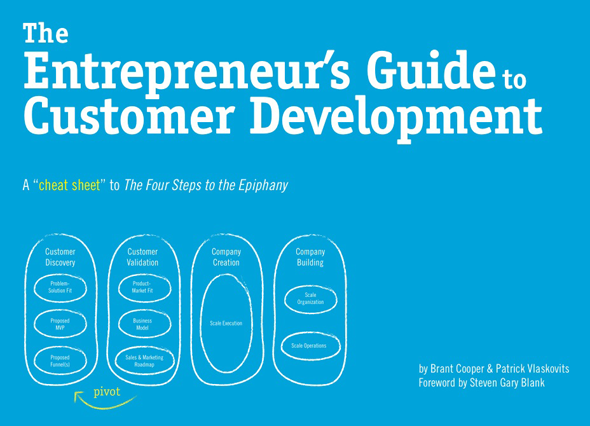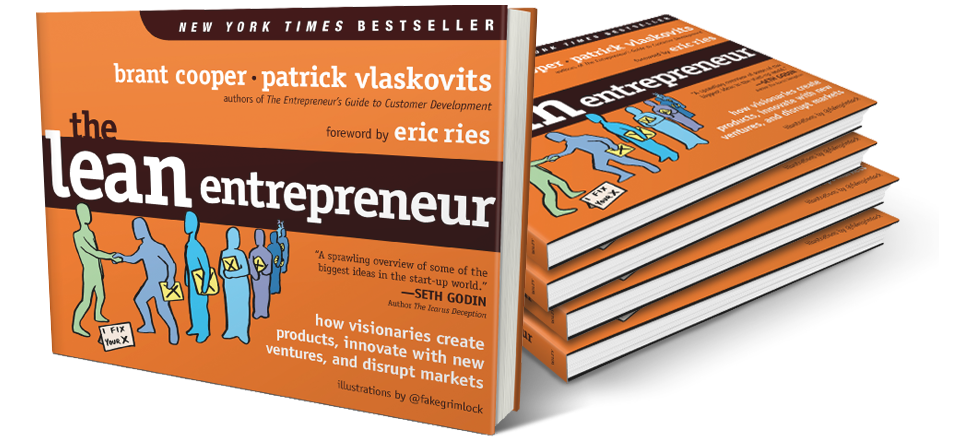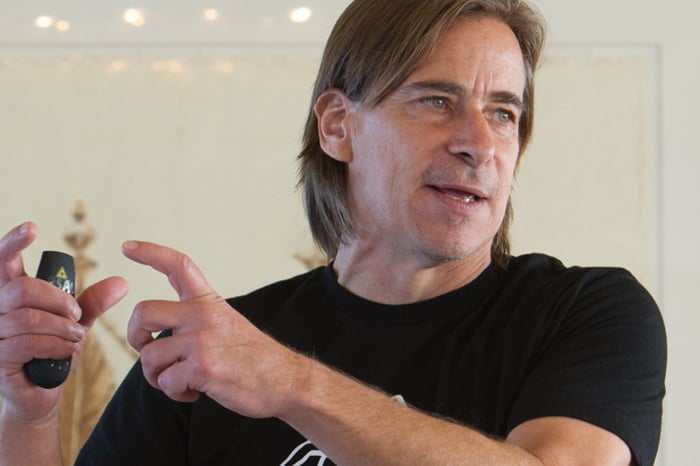 Brant Cooper is presented as “helps startups get started”. As a Lean Startup thought leader, he travels the world speaking to entrepreneurs at conferences, hackathons and workshops. Recent speaking events include the Kuala Lumpur Venture Capital Symposium, Lean Startup conferences in Vancouver and Michigan, the Forward Technology Conference in Wisconsin, the Lean Startup Challenge in Boston, and Lean Startup Machines in London, New York, Boston, Chicago and San Francisco. Brant also consults for and advises startups on Lean Startups and Customer Development, with clients in Silicon Valley, New York, San Diego, France, Australia and Singapore. Clients include Qualcomm, MOGL, HubKick, MotherKnows, i.TV, Lean Startup Machine, Discovr and many others.
Brant Cooper is presented as “helps startups get started”. As a Lean Startup thought leader, he travels the world speaking to entrepreneurs at conferences, hackathons and workshops. Recent speaking events include the Kuala Lumpur Venture Capital Symposium, Lean Startup conferences in Vancouver and Michigan, the Forward Technology Conference in Wisconsin, the Lean Startup Challenge in Boston, and Lean Startup Machines in London, New York, Boston, Chicago and San Francisco. Brant also consults for and advises startups on Lean Startups and Customer Development, with clients in Silicon Valley, New York, San Diego, France, Australia and Singapore. Clients include Qualcomm, MOGL, HubKick, MotherKnows, i.TV, Lean Startup Machine, Discovr and many others.
Brant Cooper is passionate about growing the San Diego tech community.He runs the San Diego Tech Founders monthly meetup that consistently draws between 100 and 200 startup people. Speakers have included Eric Ries, Steve Blank, KISSmetrics CEO Hiten Shah, CatchFree CEO Sean Ellis and Venture Capitalist Mark Suster. He is the curator for the San Diego edition of the Startup Digest. Brant mentored at CONNECT for four years and holds open office hours at a weekly coffee meetup that draws 10-20 people a week.
Prior to becoming involved in the Lean Startup community, Brant was involved with startups in a more traditional way. He has over 20 years experience in IT and a long track record of bringing high tech products to market. As a leader in Professional Services, Product Management and Marketing, he has directed strategy, design, marketing and implementation of numerous products for a variety of startups including Tumbleweed, Timestamp, WildPackets, Incode and InfoBright.
:: What is for you a “lean entrepreneur”?.What peculiarity should have a “lean entrepreneur”?
A lean entrepreneur is a founder who is committed to eliminating waste in the discovery of value for a particular customer segment. As Clayton Christensen says, when creating a disruptive innovation, not only is the market unknown, it’s unknowable. In other words, it’s unpredicatble. A business plan in this context is a work of fiction.
The lean entrepreneur embraces the unknown; is able to separate what has been proven in the marketplace from that which is purely imagination. All entrepreneurs are committed to executing in the known realm, but the lean entrepreneur is committed to learning when faced with uncertainty.

:: In your book you talk about the Myth of the Visionary, is there really this myth and why you think it is usually associated the entrepreneur with a hero?
Do you think Steve Jobs was a visionary and if so, why? Time and after time – as a matter of fact – the first time I ever Heard Eric Ries talk about Lean Startup, which was in China in 2009, an attendee said “What about Steve Jobs.” Jobs is the quentessenctial Vissionary. He is, according to many, the epitome of anti-lean startup. He supposedly “never listened to customers” and he envisioned the iPhone and then proceeded to build it and it changed the world. A true visionary. Except that the story is complete BS. That’s not how he changed the world at all. So yes, the myth is alive and well. Today, Jobs has been replaced by Elon Musk, who is the Visionary du jour. Let me say, this is not to take anything away from these individuals. They are extraordinary entrepreneurs. A matter of fact, I will say, they actually are visionaries. But not for the reasons espoused by the myth.
:: If we were talking about percentages, what is the importance of vision and how the execution of a successful startup?
Vision is very important. Without a vision, you have no where to go. You are wandering in a barren dessert. You rally your team around a vision: “we are going to take that hill to the North!” The point is this: real visionaries care less about the vision, tan the change they are trying to make in the world. The vision will change. You must remain flexible and respond to market conditions. I can almost guarantee that your big opportunity is going to come not from the vision itself, but from being aware of market pull as you pursue your vision.
:: If we understand a startup as an experiment. It makes sense to speak of a startup culture in their time stages?
Today’s startup world is one of meta experimentation. The startup runs experiments to find product-market fit. Venture capitalists, accelerators, angels must treat their porfolio as a lab full of experiments. Local ecosystems should treat the various funding programs as experiments themselves. You cannot predict the future. In times of major transformation such as what we are experiencing now, we all face massive amounts of uncertainty. Experimentation is the most efficient way to work through uncertainty.
:: For me, the definition of the value proposition hypothesis in a startup is one of the most difficult challenges. How would you define the concept of value proposition?
A startups value proposition is fulfilling a promise made to a customer segment. I literally tell startup founders to imagine they are holding the hands of their most prized customer, staring intently into their eyes and say “I promise my business will…” What is the promise? You cannot over promise or your customer will never appreciate you. You cannot under promise or your customer will not care.

:: You are an expert of Customer Development and author of a bestseller in this field (The Lean Entrepreneur is the bestseller). How would you define Customer Development in a sentence?
Customer development is the discovery and validation of value created for a known market segment.
:: Can you give us some tips for an entrepreneur out of the building in the right way?
I tell entrepreneurs if in the first meeting you never mention your product, that’s a good conversation. When talking about your solution, you are actually asking you customer to help solve your problema, which is developing the right solution. But what you actually want to be doing is solving the customer’s problem! So stop talking about yourself. In the EGCD, I talk about “flipping” the conversation: Say who your are, why you are here, and then mention 2 or 3 problems you THINK your customer has. Then ask your customer is that’s accurate.
:: An example?
“Hi, I’m Brant Cooper and I help innovation directors of large enterprises jumpstart their innovation practices. When I speak with executives charged with innovating, I often hear that they need to teach the organization how to move faster, but are worried about adverse affects to the core business of acting like a startup. Do you experience these problems?”
:: What are for you the key elements of an experiment to test hypothesis of a startup?
All experiments must have an objective: what are you trying to learn and why? They must have a hypothesis: “If I do x, y will happen.” They must induce a customer to take a specific action, ie respond to a “call to action” and the customer must pay some sort of currency: time, money, reputation, etc.
:: I love the vision you have on conversion funnels. Could you explain to our readers how to innovate in the funnels?
Patrick has a great talk on innovating the funnel. The core concept behind “funnelvision” is this: the more disruptive the product the more disruptive the funnel must be. If you think about it, it makes quite a bit of sense. If you, for instance, créate a radical new peanut butter, but créate the same container, the same existing labeling, and occupy the same super market shelf as all the other peanut butter, why do you think you will succeed. You appear to be just like all the others! The ability to créate passion in a product more often tan not goes beyond the product itself. In other words, it’s the product’s Brand – and by that, I don’t mean the Brand identity – logo, tagline, etc. To succeed with a more disruptive product, you must also disrupt something else related to the product that in itself provides value to the customer. Something in marketing, sales, distribution, support, etc.
:: There is much talk of the concept of a startup “traction”. What basic features should have a business model to have a strong pull?
In my view — -which is not shared by everyone – traction means you have organic growth. I don’t care what kind of business you have. When you have the right product in the right market, you should see growth with very little marketing spend. Why? Because your customers love you so much, they’re telling others, or their giving you testimonials, or they’re ‘showing you off’, or they’re providing you a case study. The foundation of traction is organic growth. I’ve said a million times: Marketing is not about creating buzz, it’s about amplifying buzz your product creates.
:: What advice would you give to an entrepreneur in Spain it is at an early stage?
Read Lean Startup and Lean Entrepeneur. 😉
:: What toolbox there should always be in the baggage of an entrepreneur?
I will give you an unusual idea. I don’t know about the traction of meetup.com in Spain, but meetup.com is doing great in the US and it’s an amazing way to meet your customers. So you are looking for customers to interview for customer development, or to do usability testing or to sell, they are attending meetups in your city. It’s a great way to discover a market segment. Why are all these people hanging out together? What pain or passion do they all have?
:: And finally, a book that every entrepreneur should read, a blog to be followed and a twitter account must.
I’ve already mentioned Eric Ries’ Lean Startup, so I’ll mention another one:
Book: Seth Godin’s Lynchpin – if you don’t know what’s holding you back, read this book.
Blog: KISSMetrics: I didn’t talk much about metrics you should be tracking, so I’ll just point you to KISSMetrics. Flat out best advice on what metrics you should be tracking and how to do it.
Twitter: @pkedrosky: Funny, investment-savvy, startup friendly, super-fricking Smart.
2nd place: The Lean Entrepreneur, Market-By-numbers.com, @brantcooper 🙂


